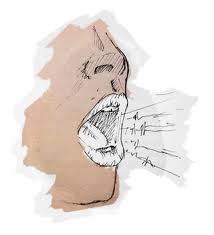 | One of the trickiest things to get a handle on as a writer is literary or writer's voice. It's also one of the most crucial because readers and editors love distinctive voices. Writer's voice is the literary term used to describe the individual writing style of an author. Voice can be considered to be a combination of a writer's use of syntax, diction, punctuation, character development, dialogue, etc. Of course, technically, every author has a voice. |
All my favorite authors have very strong and distinctive voices, how about yours? Let's look at some specific examples to help us get a handle on this topic. From Blackout by Connie Willis:
I knew I didn't like Eddritch, Colin thought.
"He did, however, mention your repeated absences. And the failing mark you got on your last essay."
"That's because Beson made me write it on this book, The Impending Threat of Time Travel, and it was total rubbish. It said time travel theory's rot, and historians do affect events, that they've been affecting them all along, but we haven't been able to see it yet because the space-tiem continuum's been able to cancel out the changes. But it won't be able to forever, so we need to stop sending historians to the past immediately and--"
"I am fully acquinted with Dr. Ishiwaka's theories."
I can identify Willis' writing with only a few sentences because her voice is so distictive. It's very in media res, almost stream-of-consciousness, with lots of gerunds.
From One for the Money by Janet Evanovich:
...Joe Morelli came into the bakery where I worked every day after school, Tasty Pastry, on Hamilton. He bought a chocolate-chip cannoli, told me he'd joined the navy, and charmed the pants off me four minutes after closing, on the floor of Tasty Pastry, behind the case filled with chocolate eclairs.
The next time I saw him, I was three years older. I was on my way to mall, driving my father's Buick when I spotted Morelli standing in front of Giovichinni's Meat Market. I gunned the big V-8 engine, jumped the curb, and clipped Morelli from behind, bouncing him off the front right fender. I stopped the car and got out to assess the damage. 'Anything broken?'
He was sprawled on the pavement, looking up my skirt. 'My leg.'
'Good,' I said. Then I turned on my heel, got into the Buick, and drove to the mall."
Evanovich is also easy to identify. In her case, she uses simple language, specific details, funny names e.g. Tasty Pastry, and lots of humor. Note, too, even with such short excerpts we can differentiate these voices from one another.
For another example, a while back I discussed Kelly Link's distinctive voice: Spec Fic Tools II: Voice.
So, the question is: how do we cultivate our literary voice? I think free-writing is effective. Try writing without your internal editor and see what comes out. :) Good luck!

Or start your story in dialogue only. Fill in the rest later.
ReplyDeleteIt's too early to say whether I have a voice that others would recognise, but if I write freely, there's definitely a distinct tone that comes through to me. The trouble is; it's very much as I speak, so it's almost conversational with a Yorkshire accent!
ReplyDeleteI like that idea, shelly!
ReplyDeleteThat sounds Bluestocking Mum! I'd really enjoy that!
Thanks for stopping by, Ladies!
The challenge is keeping the voice from being mine.
ReplyDelete